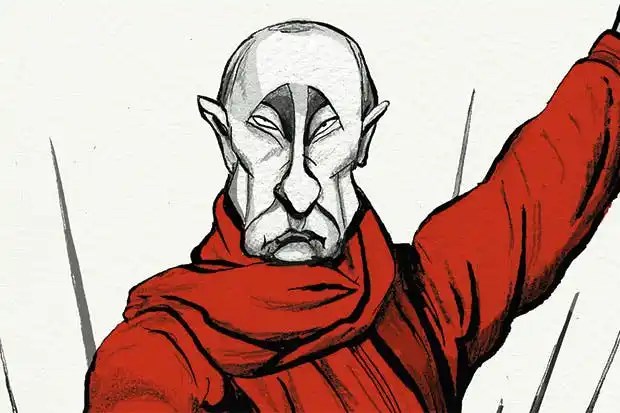‘It’s unbelievable but true,’ Vladmir Putin said on the 80th anniversary of the conclusion of the battle of Stalingrad. ‘We are again being threatened by German Leopard tanks.’
The Russian president is once again turning to an old staple he has often used to rally support in the absence of a genuine, unifying ideology: the great patriotic war, as the Russians call the eastern front in world war two. And this time, he’s doing it as he wages a war in Ukraine he has sought to portray as existential, while Russia struggles to mobilise resources, personnel and morale.
What Russia needed was a reckoning with its past – but what it got was whitewashing
The trouble with grand narratives – particularly ones where the fictions are rooted in reality – is that the longer you repeat them, the more likely you are to start believing them. And in the case of Russia’s victory in world war two – celebrated on 9 May – Putin has been doing this for nearly 20 years, gradually building a mythology of a state under siege from the dark forces of absolute evil.
It started innocuously enough, in 2005, when the Kremlin decided to revive Soviet-style mass celebrations on May 9, to commemorate the 60th anniversary of victory day. By 2015 – a year after the annexation of Crimea and the start of the so-called Russian Spring in Ukraine, when patriotically-minded volunteers mobilised to ‘defend’ Russian-speakers in Donbas from fictional Ukrainian ‘fascists’ – it had become the biggest celebration in Russia. By then, the narrative was that Russia was defending itself against a collective West bent on partitioning the country and stealing its resources, or just destroying it out of malice, depending on which pro-Kremlin pundit spun the tale.
The Soviet victory over Nazism has always been an emotionally fraught issue. On the one hand, Russia (and Ukraine) made enormous sacrifices to defeat an invading foe that was actually bent on partitioning the country and stealing its resources. Celebrating it could have been a way to foster a healthy patriotism in a nation stripped of ideology.
But on the other, Putin’s fixation on this victory served to conceal its flip side: the Stalinist policies and repressions that wiped out not just the country’s best generals, but millions of civilian lives – and with it a good portion of its political, economic and intellectual elite.
What Russia needed was a reckoning with its past – but what it got was whitewashing. Putin ended up exploiting a deep collective trauma based on an existential fear of the government, repressed it to the darkest pits of the collective psyche, then projected it onto an outward foe. In the short term, this process produced exactly the kind of Stockholm syndrome that served to rally many in the security and military elites around a government otherwise lacking in legitimacy. But eventually, the runaway train that Putin unleashed – for there is no evidence to suggest it was part of a coherent strategy – led the country into war, with the president himself believing that you win or you die.
And so, as Putin digs in for a long-haul war in Ukraine, he will increasingly frame it through the lens of the patriotic war mythology. Germany’s decision to give Ukraine tanks will inevitably play into this. But this is where things get complicated.
The mythology has served Putin well in mobilising his security elites and ensuring their loyalty. But there are limits when it comes to the public. The Russian government has outlawed the use of ‘war’ or ‘invasion’ when talking about the ‘special military operation’ for a reason. And despite opinion polls claiming a majority of Russians support the war, in fact only a small minority agree to take part in the polls, skewing the picture towards those with a favorable view, and leaving out those too scared to share their opinion.
Only dread – dark, absolute dread, buried, compressed and then rechanneled over years in a spiraling feedback loop between Putin and his security elite – can skew one’s cognitive faculties to such an extent that tanks sent to defend against an invading force are made out to be the invaders. A people brave enough to defeat Nazism – as the Russians and Ukrainians did – will ultimately find the bravery to defeat that dread, as history has demonstrated. For Putin and his security hawks, it may well be too late – and they will stick to the only myth they have left.






Comments